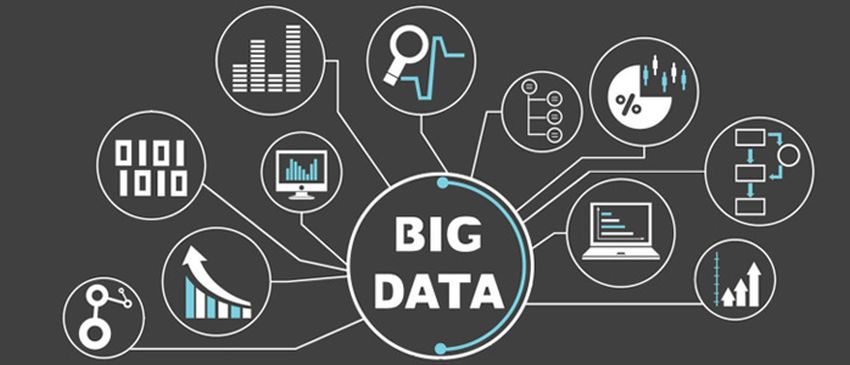With the evolution of technology, Big Data has become one of the largest opportunities for marketing and sales specialists to streamline their processes. It provides sales business with great volumes of information about customer behavior, preferences, demographics, etc. Companies that are using data efficiently will succeed in the following things:

source:thenextweb.com
- Using analytical data to explore more opportunities for business, make more accurate decisions, enhance return on investment indicators.
- Creating well-designed products and offers according to data insights.
- Offering products to the market effectively.
- Growing productivity and profitability.
Thus, each year more and more companies get excited about using these technologies not to miss the opportunities it offers. For example, according to the McKinsey Global Institute, the retailers that use Big Data indicated that they increased their margins by over 60%. However, some companies are underestimating the usefulness of data analytics and don’t use its potential at full capacity.
Page Contents
Five Benefits of Big Data in Sales
To fully capture the potential of Big Data, you should start with a well-structured plan, determine human resources roles to deal with data, and acquire the right skills. However, the most important thing to decide in favor of it is to know the benefits you can get.

source:techfunnel.com
Benefit 1 – Develop a new strategy
Today, sales companies are able to combine and sort different types of data to develop new strategies for selling their products. Both B2C and B2B organizations started to actively leverage data insights searching for the opportunities in the micro markets.
During planning processes, sales managers decide on how to invest their resources to seize the opportunities. They allocate resources across different markets according to the market’s level of growth.

source:thenextweb.com
Benefit 2 – Improve decisions and performance
Analytics along with Big Data is able to change the way companies do their business by improving productivity. New capabilities fueled by data analytics allow sales organizations to change their pricing, improve customer support, manage inventory more efficiently.
It works well for all data-based companies. However, most of them don’t know how to exploit data analytics effectively. Before implementing this technology, a company should determine what internal and external data it needs to process, develop models to work with data and find the most suitable tools and training programs for managers.

source:innovategov.org
Benefit 3 – Get to know customers better
Using Diceus Big Data tools, sales-based companies can get to know customers better by tracking their interactions across different touchpoints. Understanding better clients behavior, marketing, and sales specialists are able to make more personalized offers.
The new opportunity introduced by Big Data technology is the ability to track multichannel customers. McKinsey recommends being systematic in identifying and evaluating all the channels through which clients interact with a certain company. Combining different sources of data like transactions, browsing, and customer service can bring the most valuable insights.
Benefit 4 – Make data-driven decisions
Advanced analytical tools provide business with better decision-making. It helps companies choose the best-suited approaches, incorporate analytical techniques, and acquire the right skills.
With a data-driven approach to decision making, sales specialists can make decisions that are backed with concrete data. Allego is a sales enablement platform that uses analytics to help sales reps make informed decisions – learn more here: https://www.allego.com/blog/what-is-sales-enablement/.
For example, by analyzing the product that the company sells the best or identifying the time of the day when they reach out customers can improve customer interactions and create new products according to client’s preferences.
Benefit 5 – Turn data insights into profit

source:sloanreview.mit.edu
Today, big retailers are facing great competition. Opening a new store is no longer a good way to stay competitive. So, how do retailers succeed? They started using Big Data tools to transform their sales with better category planning.
Category management tools help identify what matters most to customers, improve assortment and merchandising, optimize investment and margins, boost category performance, and grow sales.
As you can see, Big Data addresses many challenges faced by sales organizations, Besides, it can help with the following things:
- make better pricing decisions;
- build opportunities to read customer roadmaps;
- reinvent shopping experience;
- target customers more accurately;
- create predictive models;
- test and learn continually;
- build long-term relations with customers;
- automate sales processes.
How to Use Big Data Effectively?
To get the most from data, companies have to find the right people. Below is a list of specialists you may need to hire:

source:innovategov.org
- Data scientists will ensure best-class data models support internal customers.
- Analytic consultants understand statistics and analytics and are able to enhance business decisions.
- Data strategists will ensure future data requirements are complete.
- Head of analytics drives the execution of the overall data strategy, provides proper communication among business, IT, and analytics.
In summary, to get started implementing Big Data, companies need to capture all the opportunities, identify Big Data resources, align strategies, define milestones to measure success. Keep in mind that it’s not enough to process data – you need to analyze insights and use them to grow profit.





